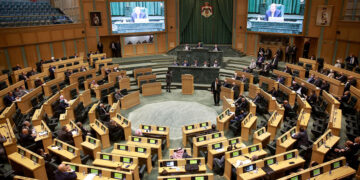Rampant abuses in country include executions; imprisonment for social media users; wrongful detention of U.S. citizens; retaliatory imprisonment of family members; and refusal to reveal the whereabouts of Jamal Khashoggi's remains
(Washington, DC, June 5, 2023): Secretary Blinken should raise pressing human rights concerns during his meetings with Saudi officials in his upcoming visit to Saudi Arabia, said Democracy for the Arab World Now (DAWN) today.
On June 2, the U.S. Department of State announced that Secretary of State Anthony J. Blinken will travel to Saudi Arabia June 6-8 to meet with Saudi officials and participate in U.S.-Gulf Cooperation Council (GCC) Ministerial meetings. Secretary Blinken is expected to discuss U.S.-Saudi strategic cooperation on regional and global issues, including economic and security cooperation. He is also expected to co-host with his Saudi counterpart a meeting on June 8 of the Global Coalition to Defeat ISIS.
"If the Biden administration wants to retain a shred of credibility for its promises to center human rights in its policies, Secretary Blinken should publicly and prominently raise specific concerns with the Saudi government," said Sarah Leah Whitson, DAWN's Executive Director. "If Secretary Blinken's visits deliver nothing more than concessions to Saudi Arabia in exchange for its normalization with Israel, he will have failed to deliver anything in the interests of the American people and abandoned the victims of Saudi Arabia's grotesque abuses."
Here are the top five human rights concerns that Secretary Blinken should raise with his Saudi Arabian counterparts:
1. Halt Arbitrary Executions Lacking Basic Due Process Protections: In the past week, Saudi Arabia has executed at least five men, two Bahrainis and three Saudis, bringing the total number of executions this year to 47 so far. Saudi authorities sentenced the two Bahraini men after grossly unfair trials during which both claimed the authorities tortured them to "confess" to acts they did not commit. According to the Saudi Organization for Human Rights (ESOHR), at least nine Saudi men who were under the age of 18 at the time of their alleged "crimes" are currently on death row in Saudi Arabia, a clear violation of international law. The nine are Abdullah al-Huweiti, Abdullah al-Derazi, Jalal Labbad, Youssef al- Manasif, Hassan Zaki al-Faraj, Ali Jaafar al-Mabiouq, Jawad Qureiris, and Ali Hassan al-Subaiti. In May 2023, the families of al-Derazi and al-Manasif appealed to Blinken to intervene in their children's imminent executions.
2. End Persecution, Imprisonment of Social Media Critics: In the past year, Saudi Arabia's Specialized Criminal Court (SCC) has imposed excessively harsh sentences on Saudi social media users, including women activists. In August 2022, it sentenced Noura al-Qahtani to 45 years in prison for "using the Internet to tear the [country's] social fabric" and "violating the public order by using social media" under the country's Counter-Terrorism Law and Anti-Cyber Crime Law. A week earlier, the same court had sentenced Leeds University student, Salma al-Shehab to 34 years in prison followed by a 34-year travel ban for tweets in support of Saudi women's rights to drive and calling for release of activists. This past week, The Guardian reported that Manahel al-Otaibi, a 29-year-old Saudi fitness instructor, has been in prison since November 2022 for using Twitter and Snapchat to support recent social reforms in Saudi Arabia and calling for an end to the male guardianship system over Saudi women.
3. Free Wrongfully Detained American Citizens: At least two U.S. citizens, including Dr. Walid Fitaihi, remain wrongfully detained in Saudi prisons. A third U.S. citizen, the 72-year-old retired engineer Saad Almadi, was released from a Saudi prison in March 2023 after the SCC sentenced him in October 2022 to 16 years in prison, followed by a 16-year travel ban (later both increased to 19 years on appeal) for tweets mildly critical of the Saudi Crown Prince Mohammed Bin Salman (MBS). Although the Saudi authorities released Almadi from prison and dropped all charges against him, they have banned him from returning back to his home and family in Florida for unknown reasons.
On April 30, Maha al-Qahtani, the wife of renowned Saudi human rights defender and prisoner of conscience, Dr. Mohammed al-Qahtani, announced that her husband was being re-tried by the SCC after he finished serving a 10-year prison sentence for his peaceful activism. Al-Qahtani, who has a Ph.D. in Economics from the University of Indiana at Bloomington and whose children are U.S. citizens, is one of many human rights defenders whom the Saudi authorities are detaining and refusing to release even after the expiry of their sentences.
4. End Hostage-Taking, Retaliatory Imprisonment of Family Members of Perceived Enemies: Since the ascension of King Salman and his son, Mohamed bin Salman, as Crown Prince, Saudi authorities have engaged in ruthless retaliatory attacks against the family members of perceived opponents. The Saudi government has subjected thousands of ordinary Saudis and royal family members to travel bans simply because of their relation to perceived enemies, activists, or challengers to his rule. This includes over 17 of the family members of Salman Alodah, whose son, Abdullah Alaoudh, resides in the United States. Saudi authorities are also refusing to release the son, daughter, son-in-law Salem Almuzaini and other family members of Saad Aljabri, a former Saudi official who sued MBS for attempting to murder him. The Saudi authorities had sentenced Omar and Sarah Aljabri in 2020 to nine and six and a half years in prison, respectively.
"All these men, women, and children, have been imprisoned for political reasons mostly related to imaginary 'security' threats," said Sevag Kechichian, DAWN's Gulf Researcher. "Secretary Blinken should call for the immediate and unconditional release of all those wrongfully detained by the Saudi authorities and urge the Saudi government to ensure fair trials for anyone suspected of committing a crime and without resorting to the death penalty."
5. Disclose Whereabouts of Jamal Khashoggi's Remains: The Saudi government has yet to reveal the fate of Jamal Khashoggi's remains since his murder in Istanbul by MBS and his agents in October 2018, claiming that the Saudi government has closed the case, following secretive and limited trials at the Riyadh Criminal Court that led to the conviction of eight of the 11 low-level officials charged with Khashoggi's murder. The court acquitted high-level officials and MBS aides, such as Saud al-Qahtani, and the authorities refused to investigate the involvement of the Crown Prince himself. The United Nations special rapporteur on extrajudicial executions found in her June 2019 report that there was credible evidence warranting the investigation of MBS's involvement in Khashogg's murder. U.S. intelligence reports concluded that MBS dispatched the 15-man hit squad responsible for the murder.
"The very least Secretary Blinken could do is urge MBS to disclose where he's hidden Khashoggi's remains, so that his loved ones can finally hold a proper memorial for him," said Kechichian.







































